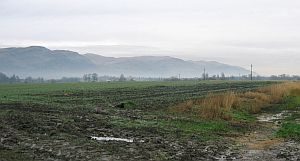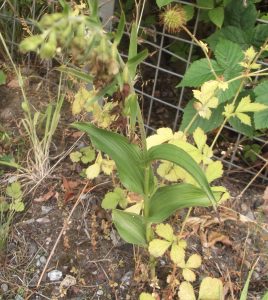
These are my local hills, the Ochils, stretching out as far as Perth, marking the boundary with Fife. They have been on the edge of my horizon for thirty-six years, and though I am not a hill-walker, they have fed my imagination all that time. Stories of historic battles, witches, artists, farmers, and silver miners, abbeys, whisky bonds and woollen mills fascinated me, but I have concentrated so far on the western edge, between Stirling and Bridge of Allan.
This weekend I went to the annual conference of the Forth Naturalist and Historian, which focussed this year on the twenty-fifth anniversary of the founding of the Friends of the Ochils and what a rich experience it was. There were talks about the birds and plants of the glens, about tree-planting and flood management, about ancient forts and victorian woollen mills, and about the work that is going on to improve bio-diversity and to manage leisure use so that the hills can be protected.
This, partly, is what I have been looking for. I am not academic or skilled enough to find this kind of information myself, and enormous resources of knowledge have opened up. But two other things came up. One is the appeal for poets to write about the Ochils. There was a sense that the hills needed to be celebrated and poetry was important to the vision. Let’s just say I’m on it.
The other is the myth of the ‘lost connection’ to nature and landscape. This is nothing new. Stories about evacuees in the last war often mentioned the ignorance of town children, and how appalling this was. City children of the working classes have not had much access to the country since the industrial revolution, and it has always been one of the markers that the middle classes have used to convey how inadequately educated working class people are. But also, it is true that cities were very much more polluted, and the environment more degraded in my childhood than they are now. Before I was ten I knew sparrows, blackbirds and pigeons, dandelions, buttercups and daisies, and buzzards or wild roses might as well have been unicorns for all the chance I had of seeing them. Even yet, when I see old man’s beard in the southern counties of England, there is a little part of me that reacts as if I’d actually met Father Christmas.
 Now the old slag heaps are green, and are considered desirable habitats for plants which need poor soils, the flashes in mining areas are often bird reserves, and I can see forty species of birds within half a mile from my house. There are salmon in the Thames and the Mersey, and initiatives in almost every part of the country to protect and reintroduce more species. I don’t want to sound ridiculously optimistic; wildlife habitats are still critically endangered and under attack. But a ‘lost connection’ is not one of the causes.
Now the old slag heaps are green, and are considered desirable habitats for plants which need poor soils, the flashes in mining areas are often bird reserves, and I can see forty species of birds within half a mile from my house. There are salmon in the Thames and the Mersey, and initiatives in almost every part of the country to protect and reintroduce more species. I don’t want to sound ridiculously optimistic; wildlife habitats are still critically endangered and under attack. But a ‘lost connection’ is not one of the causes.
Naked greed of the capitalist is of course a main cause. But this patronising attitude of the ‘educated’ towards those whom they feel are less qualified to have an opinion is their weapon. If they can convince themselves that the ‘ordinary working people’ don’t know how to look after the land, or, better, doesn’t really care what happens to it so long as they have nice houses and steady jobs, then they can have a free run at spaces working people thought were theirs. It isn’t always builders and industrialists either. Often conservationists take the same attitude, fencing off areas to protect habitats that locals have been looking after for years. And then they spend a lot of time feeling that they have to ‘raise awareness’ or ‘build connections’ while all the time letting the punters know that they don’t know how to look after this, that they really ought to leave nature safe in the hands of their betters.
John Lister-Kaye wound up an otherwise excellent talk recently by saying that ‘the public are apathetic’, and complained that their enthusiasm for nature went no further than watching tv and putting up bird feeders. It is my contention that they are not apathetic, but sidelined.
There is a local organisation near me which has fought for the last twenty years to keep their local area safe from quarrying. During that time they have campaigned, raised money and protested. They have recorded the wonderful variety of wildlife – pine martins, red squirrels, birds of prey, the plants the trees, they have discovered the archaeology and celebrated significant historical events. the community has been brought together, and they know the good bakers fro coffee mornings, the musicians to play at fundraisers, the venues who will be helpful. And the reward for all this effort is that they are now fighting off two applications for quarries.
There is another group who have looked after their local pond for many years, not only protecting it but also teaching the local primary schools about wetlands. A well-funded environemnetal organisation recently approached them and told them they would have no chance with their next funding application unless they allowed the ‘experts’ to take over.
And the Friends of the Ochils who have campaigned for twenty-five years under the aegis of several government funded bodies are now being told that the money is running out, they are no longer a priority, and will have to manage with volunteers. The man who said this looked suitably chastened by the outraged response, but it is not, in fact his fault. There is a shortage of money. There will always be bigger projects and more urgent needs. Volunteers will have to do it as they always have. It would be nice, though, if the paid employees actually gave the impression that the volunteers were up to the job.
The moral of this rant – don’t assume that people don’t care, or that nothing is being done. There’s a lot going on if you can find it, a buzz, a vibe that could put heart into the most discouraged of us. To use the metaphor I may have over-worked, there’s a wren singing.

Leave a Reply